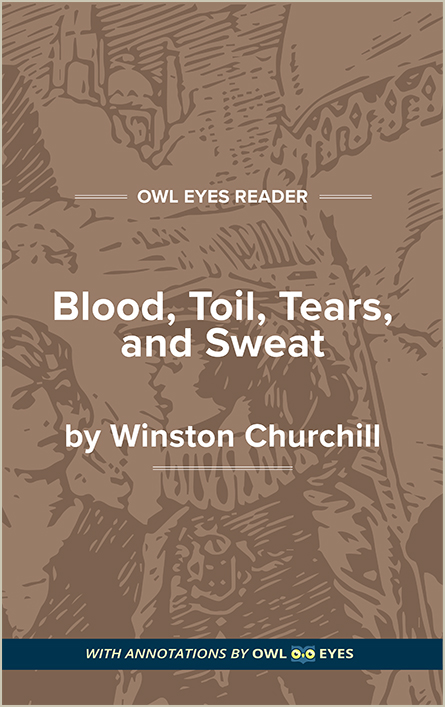Analysis Pages
Historical Context in Blood, Toil, Tears, and Sweat
Churchill’s Return from the Wilderness: In 1929, after nearly three decades as a member of Parliament, Winston Churchill was voted out of office along with many of his fellow Conservatives. Thus began his period of political estrangement, which lasted for most of the 1930s and has been labeled his “wilderness years.” During the 1930s, Churchill retreated to his country home to write a history of World War I and publish his political opinions in newspapers and magazines. Of particular interest to Churchill was the rise of the Third Reich and Germany’s aggressive rearmament. Churchill devoted much of his energy to sounding the alarm, calling for Britain to rearm itself in preparation for another war. In the aftermath of the failure of Neville Chamberlain’s 1938 Munich agreement, Churchill’s concerns became mainstream. By 1939, he had returned to office as a member of Chamberlain’s cabinet. By 1940, he was appointed Prime Minister.
The Dawn of World War II: World War I left Germany politically and economically devastated. In the interwar years, Great Britain made great efforts to heal the tensions between Germany and its neighbors, particularly France. In the late 1920s and early 30s, a new right-wing political party emerged and began to accumulate power. The Nazi party, led by Adolf Hitler, eventually took the helm of the German government in 1933 and launched a regime based on ideals of nationalism and racial purity, which were spread through a folksy, yet powerful, program of propaganda. The Nazis began to enact a series of strong-handed moves, arresting and confining German Jews, scaling up their economic and military institutions, and asserting pressure on neighboring countries. Germany provoked a diplomatic crisis when they seized the Sudetenland in 1938, citing the prevalence of German-descended people in that region of Czechoslovakia. The major European powers—France, Britain, Italy—convened to appease Germany with the Munich Agreement of September of 1938, securing peace by relinquishing miles and miles of Czech lands. The appeasement failed. A year later, Germany had begun to invade Poland, and the rest of Europe increasingly braced for war.
Historical Context Examples in Blood, Toil, Tears, and Sweat:
Text of Churchill's Speech
🔒"no survival for the British Empire, no survival for all that the British Empire has stood for,..." See in text (Text of Churchill's Speech)
""I have nothing to offer but blood, toil, tears and sweat."..." See in text (Text of Churchill's Speech)
"the air battle is continuous..." See in text (Text of Churchill's Speech)
"in the Mediterranean,..." See in text (Text of Churchill's Speech)
"many points in Norway and in Holland,..." See in text (Text of Churchill's Speech)
"the preliminary stage of one of the greatest battles in history,..." See in text (Text of Churchill's Speech)
"I now invite the House, by the Resolution which stands in my name, to record its approval..." See in text (Text of Churchill's Speech)
"on account of the extreme urgency and rigour of events...." See in text (Text of Churchill's Speech)
"The three Fighting Services have been filled...." See in text (Text of Churchill's Speech)
"either in the War Cabinet or in high executive office...." See in text (Text of Churchill's Speech)
"The three party Leaders..." See in text (Text of Churchill's Speech)
"A War Cabinet..." See in text (Text of Churchill's Speech)
"the parties of the Opposition...." See in text (Text of Churchill's Speech)
"the late Government..." See in text (Text of Churchill's Speech)
"wish and will of Parliament..." See in text (Text of Churchill's Speech)
"His Majesty's commission..." See in text (Text of Churchill's Speech)
"Delivered in the House of Commons in Westminster on 13 May 1940...." See in text (Text of Churchill's Speech)

